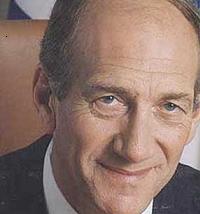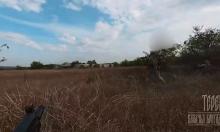Ehud Olmert lays out sweeping plan to draw border with Palestinians
In the absence of negotiations with the Palestinians, Israel plans to impose a border in the West Bank , build a new wall and move all Jewish settlers to the Israeli side all with backing from the international community, acting Prime Minister Ehud Olmert said in interviews published Friday.

In interviews this week, Olmert, the front-runner in March 28 elections, has laid out his most detailed vision about how he will proceed if he wins. His plan includes setting Israel 's borders by 2010, establishing a deadline for what would appear to be a large-scale unilateral withdrawal from much of the West Bank .
While the plan would involve uprooting some Jewish settlements, it also would retain portions of the West Bank and beef up major settlements in those areas. Israel also would retain control over Jerusalem and link a large settlement to the city. The plan falls well short of Palestinian claims to all of the West Bank and east Jerusalem .
Olmert's comments drew stiff criticism from political opponents, who accused him of jeopardizing the country's security, and Palestinian officials, who want a negotiated solution.
Olmert said he still hopes to reach a settlement, but the chances of a deal have dimmed with Hamas' victory in Palestinian legislative elections.
Israel says it will only deal with the militant group if it renounces violence and its calls for destruction of the Jewish state. Hamas rejects such demands.
Olmert also threatened to assassinate the incoming Palestinian prime minister, Hamas lawmaker Ismail Haniyeh, if he is involved in terrorism. "Anyone who is involved in planning terror attacks will be a legitimate target for liquidation," he told the Yediot Ahronot daily.
Olmert told Yediot that if the Palestinians "prefer to be dragged into the axis of evil of Iran ," then Israel will draw its own border in the West Bank based on its security needs.
"At the end of the process we will reach a complete separation from the vast majority of the Palestinian population," he told the Maariv daily.
Olmert said Israel would set its border by rerouting the separation barrier it is building in the West Bank . He called the current barrier, which has drawn international criticism, a "security barrier" meant to prevent attacks.
He told Yediot that he would try to work with Jewish settler leaders to try to get them to agree to the new line, moving settlers into settlements he plans to incorporate into Israel .
"We will definitely change the route either east or west in accordance to internal Israeli agreement," Olmert told the paper. "The fence that will be built ... will be the border line that will separate Israel and the Palestinians. Israelis will not live beyond the fence," he said.
In the absence of peace talks, Olmert's unilateral approach is meant to solve Israel 's main security problems and preserve the country's status as a democracy with a Jewish majority. It follows Sharon 's unilateral pullout from the Gaza Strip last summer.
Olmert seems ready, though, to go further than Sharon , who ruled out any further unilateral action after the Gaza pullout. Olmert, a close Sharon confidant, took over as acting prime minister after Sharon 's stroke on Jan. 4. Sharon, 78, remains in a coma.
Palestinian negotiator Saeb Erekat urged Israel to return to the bargaining table. " Israel cannot determine my borders by dictating them to me. That only prolongs the conflict, rather than solving it," he said.
Palestinian leader Mahmoud Abbas, who favors a resumption of peace talks, remains in office and has been trying to work out a power-sharing agreement with Hamas.
In Gaza , Hamas lawmaker Mahmoud Zahar rejected Olmert's plan. "We are not sort of settlement in our land," he said. "We cannot recognize any sort of these borders, especially the borders created by the wall ... separating between our land and our land."
Olmert told Yediot he will consult with world leaders to win recognition for the border. "First of all I will talk to ( U.S. ) President (George W.) Bush," he said.
In earlier interviews this week, Olmert said he would keep Gush Etzion and Maaleh Adumim, near Jerusalem, and Ariel, deep in the West Bank, as well as maintaining control over the Jordan River Valley, the line between Jordan and the West Bank.
However, it is unclear whether he could retain these areas, especially Ariel.
Bush has backed Israel 's claims to retaining some settlement blocs, but American officials have reacted coolly to Israeli claims on Ariel. Washington has also expressed displeasure over Israeli plans to link Maaleh Adumim to Jerusalem , despite Olmert's assertion in Yediot that the U.S. "has no doubt" that this will happen.
Officials at the U.S. Embassy did not return a message seeking comment.
Olmert hinted that he is prepared to redraw Jerusalem 's border, giving up a refugee camp on the city's outskirts. But he said the city's holy sites, including the Old City and Mount of Olives , would stay in Israeli hands.
Even with the settlement blocs under Israeli control, the plan would mean a pullout from most of the West Bank and removal of dozens of settlements.
Settler leader Bentzi Lieberman said the Gaza pullout was a surrender to Palestinian violence, and further unilateral action would threaten towns inside Israel .
"Now the Palestinians know that terrorism pays off," he said. "I think his plan is a serious danger to Israel . He is bringing Hamastan to our doorsteps."
Olmert's political rivals also attacked his latest plan, reports the AP.
D.M.
Subscribe to Pravda.Ru Telegram channel, Facebook, RSS!




